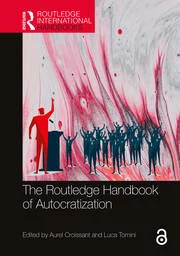Published in: Routledge Handbook of Autocratization, ed. by A. Croissant and L. Tomini
The present understanding and unchartered research paths of autocratization are documented in a new Handbook, published in May 2024. Covering Asia, North and South America, Europe, the Middle East, and North Africa, the volume presents in-depth explanations and a wealth of region-specific knowledge.
My chapter maps the scholarly discussion on autocratization processes in post-Soviet states. Autocratization is understood broadly, as a decline of democratic qualities that may be limited to changes within a political regime, but may also lead to a change of a given political regime. This dual notion of regime change is important for the post-Soviet region and its scholarship, as autocratization has occured while the question of what constitutes a political regime, that is, its values, norms and structures of authority, continue to be contested among political actors.

These struggles indicate unsolved problems of state building that manifest themselves not only in Russia’s war against Ukraine, Russia’s imperial identity promoted by the Kremlin, and the various other, partly unfrozen ethno-territorial conflicts persisting in many post-Soviet states. More fundamentally, state building involves creating nation states based on a shared national identity, and establishing state capacity based on functioning legal-rational institutions. Thus, state building is about defining political communities and political authority structures that are consistent with state territories, and about developing states that are trusted by the population and insulated from predatory political or rent-seeking business elites.
I argue that autocratization in the post-Soviet region has been closely linked to these problems and strategies of state building. Divides over national identities have impeded autocratization in Moldova and Ukraine, destabilized autocratic rule in Kyrgyzstan and Tajikistan, and underpinned the protest movement against autocratic rule in Belarus. Nationalist mobilization fostered autocratization in Armenia, Azerbaijan, Georgia and Russia. Relatively homogenous national identities and nationalizing policies stabilized autocratic rule in Kazakhstan, Uzbekistan and Turkmenistan. Weak state capacity and institutions affect all countries and have facilitated informal patron-client networks that undermine both autocratization and its reverse process, democratization.
The chapter summarizes two theoretical approaches that have shaped the comparative study of democratization and autocratization in post-Soviet states: competitive authoritarianism and patronal politics. These theories are complemented by an overview on contributions that employ the concepts of legitimacy and legitimation to study regime changes in post-Soviet Eurasia. Autocratization episodes are identified using V-Dem’s Electoral Democracy Index. The final section draws some lessons and suggests future research perspectives.
References:
Cassani, Andrea and Luca Tomini. 2019. Autocratization in Post-Cold War Political Regimes. London: Palgrave.
Croissant, Aurel and Jeffrey Haynes. 2021. “Democratic Regression in Asia: Introduction.” Democratization 28(1):1-21.
Hale, Henry E. 2015. Patronal Politics. Eurasian Regime Dynamics in Comparative Perspective. Cambridge: Cambridge University Press.
Hanson, Stephen E. 2017. “The Evolution of Regimes: What Can Twenty-Five Years of Post-Soviet Change Teach Us?” Perspectives on Politics 15(2):328-341.
Levitsky, Steven and Lucan A. Way. 2010. Competitive Authoritarianism. Hybrid Regimes After the Cold War. Cambridge: Cambridge University Press.
Way, Lucan A. 2015. Pluralism by Default. Weak Autocrats and the Rise of Competitive Politics. Baltimore: Johns Hopkins University Press.